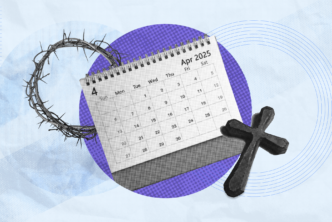Easter (or “Pascha,” the Greek word for “Passover”) will be celebrated by Orthodox Christians on Sunday, May 5, 2024. Let’s take a brief look at not only the history behind the differences but also the manner in which Eastern Christians celebrate the Lord’s resurrection.
The Orthodox celebration of Easter, ‘Pascha’
The dating of Easter has always been a complicated issue, going all the way back to the second century. At that time, the main divide was between those who celebrated on precisely the 14th day of Nisan (the Jewish Passover) and those who celebrated on the Sunday following the 14th of Nisan. This variance came to a head at the first Council of Nicaea (AD 325), when that assembly of bishops decided to regulate the celebration to always occur on a Sunday, or what had come to be called “the Day of the Lord” (Rev. 1:10).
A 19-year cycle of celestial calculations was developed, and this cycle, connected with the Julian calendar, has remained in use in the East. An 84-year cycle came to be used in the Western half of the empire, and so the first discrepancy (since the First Council of Nicaea) began to occur. With the assistance of the best astronomers and scientists of the time, Pope Gregory XIII revised the Julian calendar in 1582 in order to improve its accuracy. A reform of the Western lunar calendar—connected with the dating of Easter—also occurred.
Over the course of several centuries, many countries adopted this “Gregorian Calendar,” with the exception of the Eastern Orthodox Church. As a result, there can be anywhere from a one- to a five-week discrepancy between the Eastern and Western celebrations of Easter. They can also occur on the same day.
Even when we celebrate on different dates, the focus is much the same. Like that of Western Christians, the Orthodox celebration of Pascha is focused on the triumph of our Lord and Savior Jesus Christ over death itself, freeing us from the bondage of sin and restoring our ability to have a relationship with God. The great Paschal hymn refrains: “Christ is risen from the dead, trampling down death by death, and upon those in the tombs bestowing life!”
Preceded by a week of daily services called Holy Week, traditional Orthodox celebrations of Pascha begin late in the evening on Holy Saturday and conclude at early dawn on Sunday. The midnight vigil is often followed by an Agape feast, in which parishioners share delicious foods with one another, including roasted lamb, cheeses, assorted fruits, homemade baked goods, and Pascha eggs dyed a shade of deep red.
Learn more about the history of the Eastern Orthodox Church and its celebration of Pascha, the Lord’s resurrection, in History of the Holy Eastern Church (6 vols.) collection by John Mason Neale, who writes from a Western (English) perspective, as well as Melito of Sardis’ On Pascha, part of the Popular Patristics Series, Part 1 (10 vols.).
Related articles
- What Is Holy Week? Ideas for Remembering Its Significance
- Jesus’ Final Week: A Closer Look
- 5 Suggestions for Observing Good Friday
- The Death Side of Life: Paul’s Scars and the Meaning of Good Friday
- What Good Friday Teaches Us about the Meaning of Suffering
Resources related to the Resurrection
Mobile Ed: NT156 The Significance of the Resurrection (2 hour course)
Regular price: $69.99
Figuring Resurrection: Joseph as a Death and Resurrection Figure in the Old Testament and Second Temple Judaism
Regular price: $26.99

The Final Days of Jesus: The Most Important Week of the Most Important Person Who Ever Lived
Regular price: $12.99
Crucifixion: In the Ancient World and the Folly of the Message of the Cross
Regular price: $17.99





